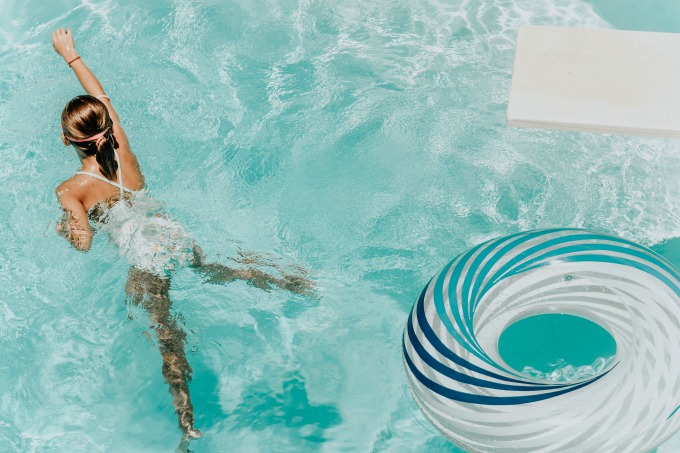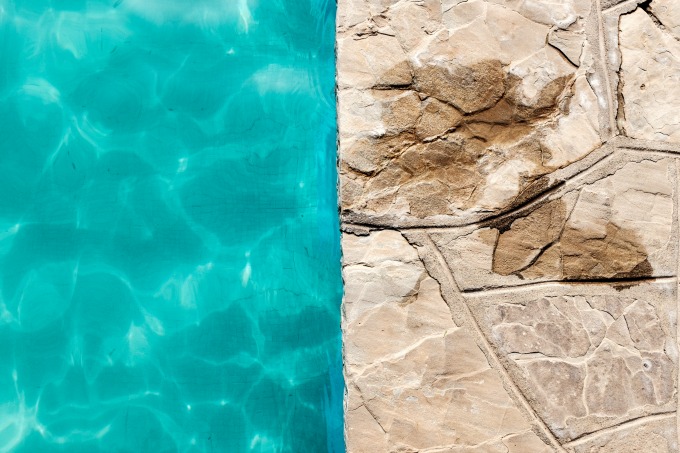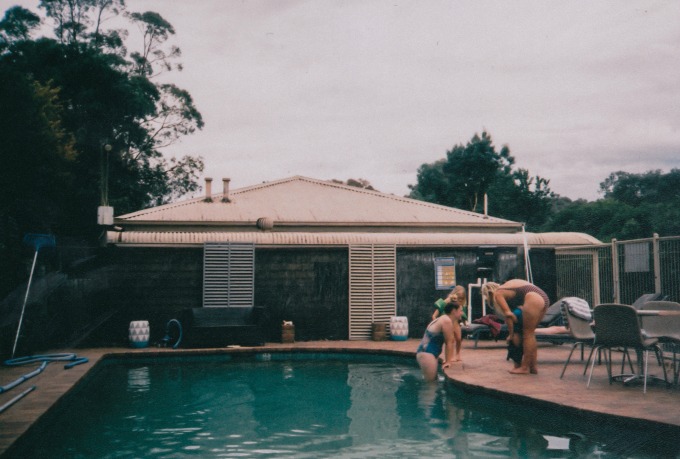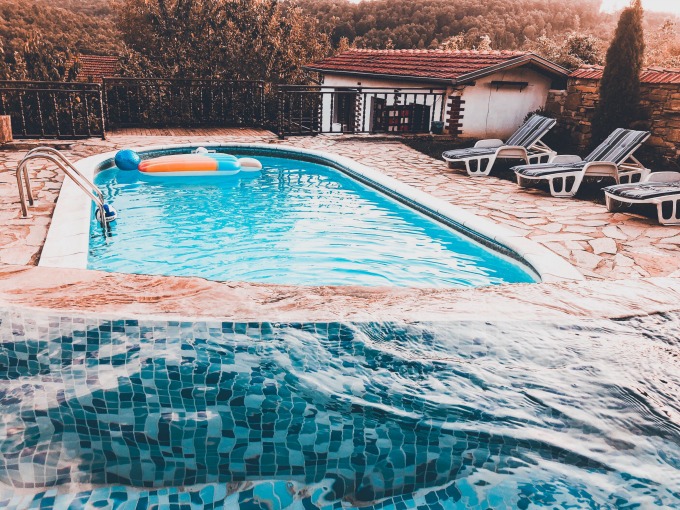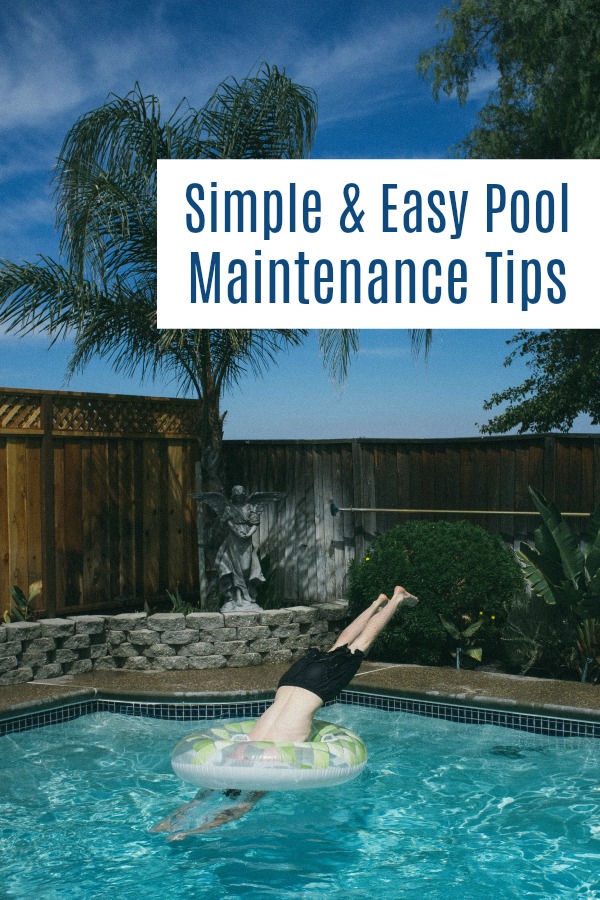Having your own swimming pool can be pretty much the best thing ever, even the swimming pool maintenance. You get to enjoy it when you want, and you don’t have to share it with the public. It’s also a great way to spend your summer days.
You can also host fun pool parties and great barbeques, and have swimming as an option for your guests. However, before you have a pool built, or you buy an above ground pool, you need to make sure you’re ready for the commitment your own pool requires.
Being a responsible pool owner is a lot of responsibility. Not only do you have to be aware of water safety and regulations for your area, you also need to maintain your pool.
Regular swimming pool maintenance is essential so that the water is the right temperature and your pool stays clean. If you don’t take the time to care for your swimming pool, it’s not going to last very long. It’ll also be very expensive for you to continually drain it and refill it, and have the pump looked at. A common problem is that people don’t realize how much commitment caring for a pool is, and they don’t take the time to learn how to properly maintain it. While they’re putting in the effort, they simply go about it the wrong way.
Swimming pool maintenance has a lot of moving parts. It includes removing the debris, skimming the water, and brushing the sides of the pool It can also mean treating the water with various chemicals to maintain the pH balance. You want to be very careful
While maintaining a pool sounds like a lot of work, it’s really not that bad. A few minutes every day, and half an hour or so once a week, and you’re pretty much good to go. Here are 7 tips we have found helpful:
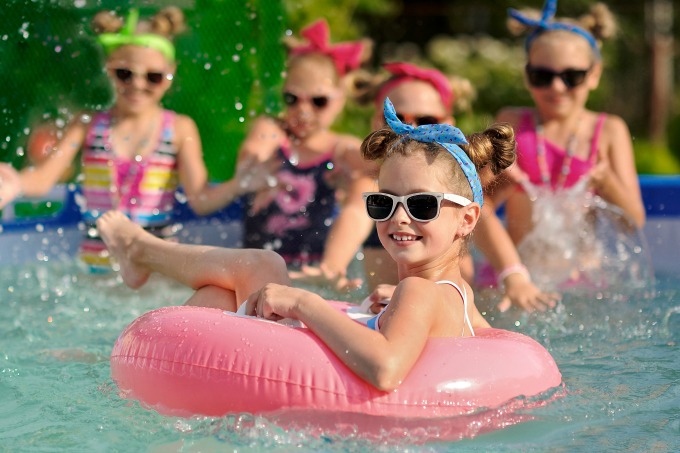 Pool Maintenance Safety Tips
Pool Maintenance Safety Tips
Links may be commissioned. Shopping through them helps support our site at no additional cost to you.
Keep a log
It sounds simple, but keep a pool maintenance log. This will help with not only regular maintenance, but let you know if you might have an issue. When you test your water, just jot down what the results are. If you keep having to add more and more algicide, there may be an issue with your water temperatures, Or there could be a problem with your pool filter not running at maximum efficiency. A log will help you head off problems while they’re still small, and before they become expensive fixes.
Buy the right chemicals, and tools
There are certain types of chemicals that you’ll need for your swimming pool. These range from diatomaceous earth (DE) to chlorine to algicide and clarifier. Buying top quality products is essential if you want your swimming pool to be the best it can be. While you can buy products that are cheaper, make sure you’re getting the same deal. Chlorine tablets and 3 in 1 tablets can, and often do, look the same, and you won’t even realize they’re not the same thing. Take a little time to read the labels, research, and make sure they’re the same quality as the name brands, and the same product.
Another thing that can make a world of difference is a pool vacuum. Instead of manually having to brush the sides, and the floor, of the pool, you simply hook the vacuum up to the drain, and let it work its magic. This gadget will help to prevent algae and scale from building up, and it goes directly into the drain, and through the pool filter system.
When the kids aren’t home.
During swimming pool maintenance, you may be handling chemicals that can be harmful before they’re diluted for use in the pool. These chemicals might contain somewhere between twelve to ninety five percent chlorine. If the fumes from that are inhaled, or if some flies into the air, it could be a real danger. It’s best to plan your maintenance schedule for a time when your kids are at soccer practice or some other activity. You’ll also want to keep your pets away from this area. Lock them in the house, or put them in a side yard. That way, you won’t have to watch out for the children while you’re trying to safely handle pool chemicals.
Have someone watch the process.
While you mix the chemicals, and make sure someone’s watching. They don’t need to be standing over your shoulder, but let them know what you’re doing in case there is an issue. No one wants to get hurt. If there’s a bag of chemicals open, watch to make sure there are no spills that someone might accidentally be exposed to. Double check that you’re using the right ratios of chemicals for your pool’s ecosystem. It’s easy to get the pH off with a minor mistake. The old adage of “measure twice, cut once” applies here too, although it’s more like “test twice, treat once.”
Use the safety gear.
We all get in a hurry from time to time, and like to take shortcuts. It’s human nature. For some reason, we seem to be particularly resistant to safety equipment like goggles and respirators. Let me tell you – you don’t want to get chemicals in your eyes while you’re doing pool maintenance. If you think a chlorine heavy pool burns your eyes while you’re swimming in it, hooo boy. Or that chlorine smell when you’re using bleach, and how it tickles your lungs? Yeah, the straight chlorine for your pool will cause some real respiratory problems if you’re not careful. You might also want a pair of heavy leather gloves to wear while mixing chemicals. Get a pair that are only for this purpose, and there’s no cross-contamination. Pool chemicals are less likely to burn your skin, and you have almost zero chance of unsuspectingly transferring chemicals.
Don’t mix chemicals on a windy day.
Most pool chemicals come in either big bags or buckets, and they’re usually powdered. It doesn’t take much for the wind to pick chemicals up and disperse them into the air. Follow recommended procedures, and add the swimming pool chemicals directly into the water – instead of adding water to the chemicals. You should crouch down to the pool and add them closely to the surface of the water. On a windy day, that’s just asking for trouble. So, if it’s a scheduled maintenance day and it’s really windy, you might want to change your plans.
Make sure to store the chemicals safely.
There are several ways you can store your pool chemicals and be safe. Some people store their chemicals in a locked shed or even their pool house. You should only store pool treatment chemicals in there, and not any kind of tools or things that might ignite, like paint thinner or gasoline. Make sure that any kids know not to play in or around that area, and keep animals out of there, too. You don’t want them getting into something they shouldn’t.
Some chemicals should be stored at temperatures below 95 degrees Fahrenheit. If high temps are an issue, you may need to come up with another storage solution. Every time you do your pool maintenance process, make sure to walk around the area after you’re finished. This is an easy way to gather up all your supplies and chemicals, and get them back to their storage room safely. Everything gets put up properly.
This might seem a little extreme for swimming pool maintenance, but an ounce of prevention is worth a pound of cure. And no one wants chemical burns, or to have to close the pool down while they figure out what’s wrong with it. Swimming pool maintenance, and chemicals, are not something to be lax with.
You may also like
- Exciting things to do in Summer
- DIY Giant Yard Dominoes
- Ways to Beat the Summer Heat

